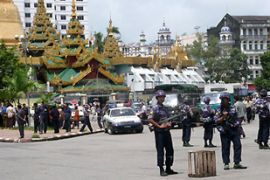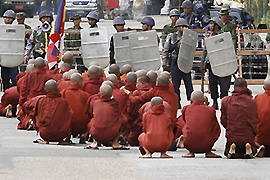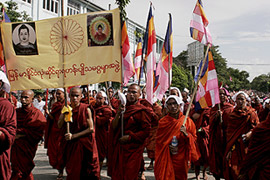Myanmar marks bloody crackdown
Al Jazeera’s correspondent finds country still gripped by despair one year on.

Our correspondent, who we are not naming for safety reasons, says a noticeable rise in the number of street beggars indicates increased hunger while child labour remains commonplace.
At the same time tourism, one of the few economic lifelines open to ordinary people, has been reduced to a trickle.
 |
|
Many were arrested or killed following last year’s crackdown [Reuters]
|
Myanmar exile groups around the world are planning demonstrations and other events to mark Friday’s anniversary.
But human rights groups say any anniversary demonstrations inside Myanmar are extremely unlikely.
Speaking to our correspondent in secret, one activist told Al Jazeera that fear was keeping people quiet – remembering the crackdown publicly risks imprisonment and torture.
“All people are frightened,” he said. “Everywhere there are military spies.”
More than 3,000 people were arrested following last year’s crackdown and most of the alleged protest leaders remain in jail.
Human rights groups say some of those detained have died in jail or have been crippled as a result of injuries inflicted by their jailers.
Tight security has been put in place across the country, particularly in the former capital, Yangon, which was the focus of last year’s protests.
Despite this, on Thursday police said a small bomb had exploded in the centre of the city, causing a number of minor injuries.
It was not clear who planted the bomb, although small bomb attacks are relatively common in Myanmar.
“It could have been anyone on any side with any number of objectives,” one unnamed diplomat told Reuters.
Death toll
 |
|
Thousands of monks took to the streets in the 2007 protests [EPA]
|
According to the UN, at least 30 people were killed when soldiers and armed police moved to crush the 2007 demonstrations, although human rights groups say that with many still unaccounted for, the real toll was probably far higher.
Many monks, who took up leading the protests after the original leaders were arrested, are thought to have been among those killed.
Earlier this month, activist Nilar Thein, an organiser of the 2007 protests, was arrested and detained after a year on the run.
The crackdown triggered widespread international condemnation and a toughening of sanctions by Western governments against Myanmar’s military rulers.
But our correspondent says that despite this, the military government remains afloat – largely because of the continued flow of trade from China.
In return, Myanmar’s rulers provide gemstones and hardwood timber – the latter at levels environmentalists say are unsustainable.
The trade has helped Myanmar’s military, which has ruled the country since 1962, maintain its iron grip on the country.